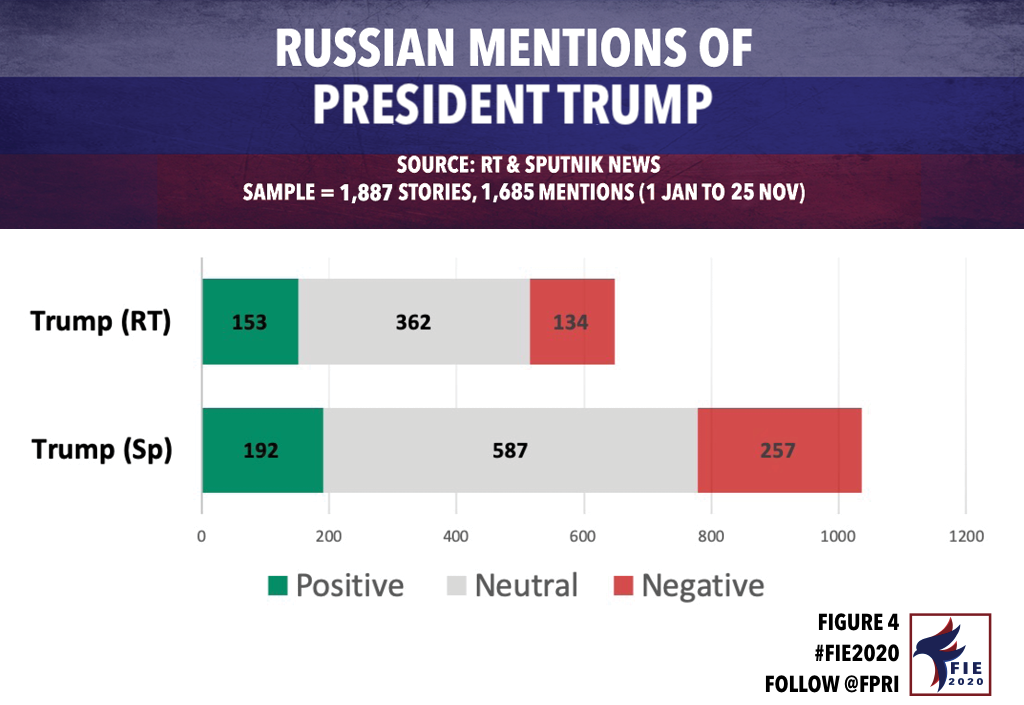A nation must think before it acts.
Russia’s Media Mentions of President Trump
November 26, 2019
Post by Clint Watts
Last week, FPRI’s Foreign Influence Election 2020 (FIE 2020) Project published its first analysis of Russia’s media mentions of the 2020 Democratic candidates. The FIE 2020 database now includes updates since its first analysis, bringing the total number of articles analyzed to 1,887 since January 1, 2019. This week, FIE 2020 presents an analysis of the Russian media mentions of the GOP candidates for the 2020 election.
The GOP field consists of the incumbent (President Donald Trump) and three challengers who have entered (and exited) the field at different times—former Governor Bill Weld, former Governor Mark Sanford and former Congressman Joe Walsh. The stories analyzed produced a dozen mentions in total for Weld, Sanford and Walsh. Stories where GOP challengers were mentioned predominantly noted their entrance in the race and, in the case of Sanford, his exit from the presidential race. Only one story related to the GOP challengers demonstrated a Kremlin perspective: a September 25 post on RT that pitted Weld and Walsh as pro-impeachment as compared to Democratic Congresswoman Gabbard, who was pitted as anti-impeachment.
President Donald Trump surfaced in 1,685 mentions in the FIE 2020 database since January 1. Figure 3 (above) represents the distribution of mentions and Figure 4 (below) shows the count of mentions assessed from each Russian media outlet (counterparts to Figure 1 and Figure 2 for the Democratic candidates).
Analyzing Trump from Russia’s perspective proves to be quite complicated as he serves as both the head-of-state and a candidate in the 2020 election. Russia’s mentions of Trump suggest a nuanced approach with respect to the President:
- Trump’s mentions are greater in number than all mentions of Democratic challengers we’ve logged to date.
- Trump received slightly more positive mentions to negative mentions on RT, but more negative mentions to positive mentions on Sputnik News. (Figure 4)
- Of all the candidates evaluated to date, Trump proportionally received the third-most positive coverage from Kremlin outlets, behind Gabbard and Sanders.
A future post will more deeply examine the themes and narratives of Kremlin state-sponsored outlets. However, a brief examination and comparison of the positive and negative mentions of President Trump illustrates dual lines of influence from Putin’s information-warfare wizards. Here are a few additional observations:
- Both RT and Sputnik News offer roughly the same mix of opinion to news content related to President Trump. However, these two news outlets utilize different mediums.
- RT is a television broadcast service and an online news outlet. Sputnik News is a wire service and an online news outlet that offers radio broadcasts.
- RT’s content mirrors a cable television news outlet, with shorter pieces and a heavier U.S. domestic news focus. RT’s slightly positive coverage plays to President Trump’s outsized coverage on television and the 2020 election.
- Sputnik News offers more pieces by volume and includes more international news. Sputnik News appears to seek a larger world audience in the English language covering President Trump’s foreign policy moves.
- Positive mentions of Trump surface more often in the context of:
- Trump’s allegations of “fake news” and mainstream media bias against him.
- Battles between Trump and Biden dating back to May 2019 and Trump vis-à-vis most Democratic candidates.
- The impeachment proceedings and former Special Counsel Mueller’s investigation.
- Assertions that technology companies restrict free speech and are biased against conservatives.
- Negative mentions of Trump surface more often in the context of:
- Foreign policy—the preponderance of negative mentions pertain to Trump’s actions and views with respect to foreign conflicts and international relations.
- Relevant examples include content on abandoning the Kurds in Syria, ending the nuclear deal with Iran or threatening war with Iran, initiating a trade war with China and unfairly suppressing Huawei, standing in the way of the Nord Stream 2 pipeline and others.
- In general, President Trump may be mentioned negatively in any scenario where his words or actions are at odds with Russian foreign policy.
- Allegations of crude or unprofessional behavior.
- Foreign policy—the preponderance of negative mentions pertain to Trump’s actions and views with respect to foreign conflicts and international relations.






